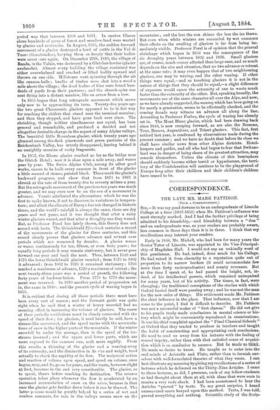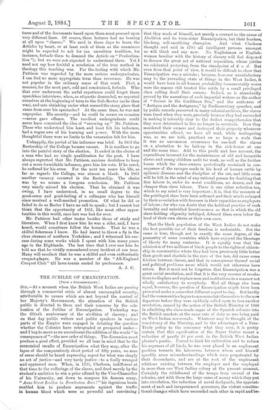CORRESPONDENCE.
THE LATE MR. MARK PATTISON.
trams A CORRESPONDENT.] SIR,-It was my good-fortune to be an undergraduate of Lincoln- College at a time (1847-1851) when Mr. Pattison's influence was most strongly marked. And I had the further privilege of being admitted to his friendship,—and friendship between a " don " and an undergraduate was, as your readers are probably aware,. less common in those days than it is in these. I think that my recollections may interest your readers.
Early in 1848, Mr. Michell, who had been for many years the- Senior Tutor of Lincoln, was appointed to the Vice-Principal- ship of Magdalen Hall. I would not say an unkindly word of this gentleman. He had, indeed, done much for his College. He had raised it from obscurity to a reputation quite out of proportion to its narrow borders (it could accommodate few more than forty undergraduates) and scanty revenues. But at the time I speak of, he had passed the height, not, in- deed, of his intellectual powers, which remained unimpaired for many years, but of his activity. The times, in fact-were changing ; the traditional conceptions of the studies with which Oxford busied itself were passing away ; and he was not the man for the new order of things. His retirement made Mr. Pattie= the chief influence in the place. That influence, now that I am come to the point, I find it difficult to describe. Mr. Pattison was not a successful maker of "first classes." He did not give to his pupils ready-made conclusions in mental science or his- tory which might be conveniently reproduced in examinations. It was his chief complaint against the "Final Classical Schools" at Oxford that they tended to produce in teachers and taught the habit of constructing and appropriating such conclusions. He used to send us away from his lectures with the feeling of Towed inquiry, rather than with that satisfied sense of acquisi- tion which is so conducive to success. But he made in think. He made us desire to know. He taught us to enter into the real minds of Aristotle and Plato, rather than to furnish our- selves with well-formulated theories of what they wrote. I can best illustrate my meaning by giving my recollections of a series of lectures which he delivered on the Thirty-Nine Articles. I came to those lectures, as did, I presume, such of my fellow-students as bad thought about them at all, with ideas that were soon to receive a very rude shock. I had been accustomed to hear the Articles " proved " by texts. To my great surprise, I heard unmeasured scorn heaped upon this method. Texts, I was told, proved everything and nothing. Scientific study of the Scrip. 'lures and of the documents based upon them must proceed upon very different lines. Of course, these lectures had no bearing at all upon "classes." We used in those days to learn the Articles by heart, or at least such of them as the examiners might be expected to ask for (an unwritten tradition, for instance, forbade them to demand the Article on " Predestina- tion "); but we were not expected to understand them. Yet I need not say how fruitful a revelation of the true method in theology this teaching was. For the feeling with which Mr. Pattison was regarded by the more serious undergraduates, I can find no more appropriate term than reverence. He was not popular in the ordinary sense of that word. That, a manner, for the most part, cold and constrained, forbade. Who that ever underwent the awful experience could forget those speechless interviews, when, as etiquette demanded, we reported ourselves at the beginning of term to the Sub-Rector (as he then -was), and sate shrinking under what seemed the stony glare that came from over his spectacles P At the same time, he was not unpopular. His severity—and he could be severe on occasion —never gave offence. The rowdiest undergraduate could never have conceived the idea of "screwing up" Mr. Pattison. Those who understood him least, and least felt his influence, had a vague awe of his learning and power. With the more thoughtful there were no limits to the veneration felt for him.
Unhappily, the period of his influence was brief. In 1851 the Rectorship of the College became vacant. It is needless to go into the painful story of the election. It ended in the choice of • a man who had no single qualification for the post. I have always regretted that Mr. Pattison, anxious doubtless to keep out a more formidable influence, gave him his vote. If he erred, he suffered for his error. For the next ten years his life, as far as regards the College, was almost a blank. In 1861 another vacancy occurred in the Rectorship. The choice was by no means a foregone conclusion. Mr. Pattison very nearly missed his election. That he obtained it was Owing, I have understood, in no small degree to the good-sense and good-feeling of a colleague who has himself since received a well-merited promotion. Of what he did or failed to do as Rector I have no call to speak; but I cannot but think that the opportunity of 1851, like most other oppor- tunities in this world, once lost was lost for ever.
Mr. Pattison had other tastes besides those of study and literature. When I first knew him he was a rider, and, I have heard, would sometimes follow the hounds. That he was a skilful fisherman I know. He had learnt to throw a fly in the -clear streams of northern Yorkshire; and I witnessed his sue- oess during some weeks which I spent with him many years ago in the Highlands. The last time that I ever saw him he told me that he vividly remembered every incident of our tour. Many will recollect that he was a skilful and even enthusiastic croquet-player. He was a member of the "All-England Croquet Club" till lawn-tennis ousted its predecessor.
A. J. C.



































 Previous page
Previous page